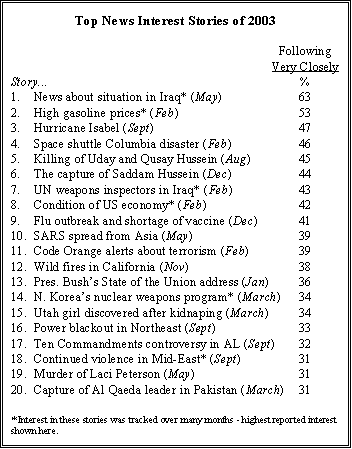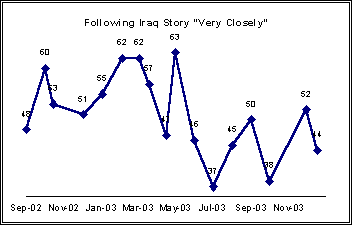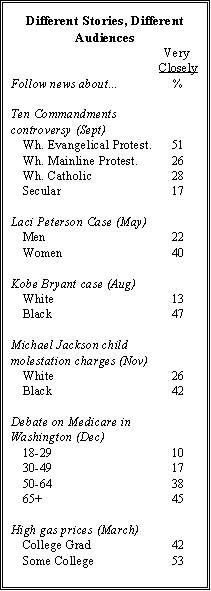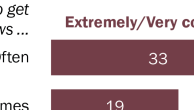
The situation in Iraq dominated the public’s news interest in 2003. Beginning with the debate over war, through the war itself and its aftermath, interest in news from Iraq generally stayed at a high level. In May, 63% of Americans said they paid very close attention to news from Iraq (another 29% paid fairly close attention), the highest news interest for any story measured this year. But interest was about as high during the war in Iraq (62% very closely in March), and in the debate over going to war in February (62% very closely).
Several separate developments in the Iraq crisis also drew substantial public interest, including the killings of Saddam Hussein’s sons in August (45% very closely) and the capture of Hussein in December (44% very closely). In all, news from Iraq accounted for four of the year’s top ten stories in the Pew Research Center’s news interest index.
As in previous years, high gasoline prices also attracted a great deal of public attention in 2003. In February, more than half of Americans (53%) tracked this story very closely, and interest in March was about as high (52%). Americans become aware of increases in gas prices not just from the news media, but also when they go to buy gas.
A number of disasters, both natural and man-made, attracted broad interest this year. Nearly half of Americans paid very close attention to reports on Hurricane Isabel (47% very closely) and the disaster involving the Shuttle Columbia (46%). The public also demonstrated sustained interest in economic news; attention to this story was highest in February (42%).

Tracking Iraq News
Public interest in news from Iraq, while high, still did not match attention to the conclusion of the first Persian Gulf war in March 1991. Two-thirds of Americans (67%) followed the end of that war very closely. But following the end of that conflict, there was far less interest in subsequent news from Iraq.
In the current conflict, there also was a significant decrease in public attention to news from Iraq after President Bush declared in May that major combat had ended. By July, fewer than four-in-ten Americans (37%) were tracking developments in the country very closely, down from 63% in May. But as the level of U.S. casualties rose in late summer and fall, public interest rebounded. In November, more than half of Americans (52%) tuned in very closely to reports from Iraq. In December, 44% said they tracked overall news from Iraq very closely, while the same percentage (44%) said they paid very close attention to news of Hussein’s capture.

Divided Audiences
News from Iraq generally attracted strong interest across the demographic and political spectrum. But audiences for other high-profile stories were divided by religion, gender, age and other factors. In September, stories about the removal of a monument to the Ten Commandments from an Alabama courthouse drew broad interest from white evangelical Protestants, but far less attention from members of other religious groups. Nearly twice as many white evangelical Protestants paid very close attention to the Ten Commandments case compered with non-evangelical Protestants and White Catholics (51% vs. 26%, 28%).
Similarly, the case of Laci Peterson, whose murder received intense coverage from cable news outlets, drew much more attention from women than men (40% vs. 22%). The gender split was nearly as large in attention to news of the safe recovery of Elizabeth Smart, the Utah girl whose kidnaping also attracted considerable coverage (40% men, 28% women).
African Americans paid far more attention than whites to criminal allegations against black celebrities, basketball star Kobe Bryant and singer Michael Jackson. In August, African Americans were nearly four times more likely than whites to say they tracked the Bryant case very closely (47% vs. 13%).
Traditionally, young people pay less attention to the news than do older Americans, but this gap was especially large in interest to reports on the congressional debate over adding a prescription drug benefit to Medicare. Americans age 50 and older and especially those 65 and older tracked the Medicare debate much more closely than younger people.
Education also is a major factor in news interest. In March, nearly six-in-ten (57%) of those with a high school education tracked high gas prices very closely compared with only about four-in-ten college graduates (42%).




